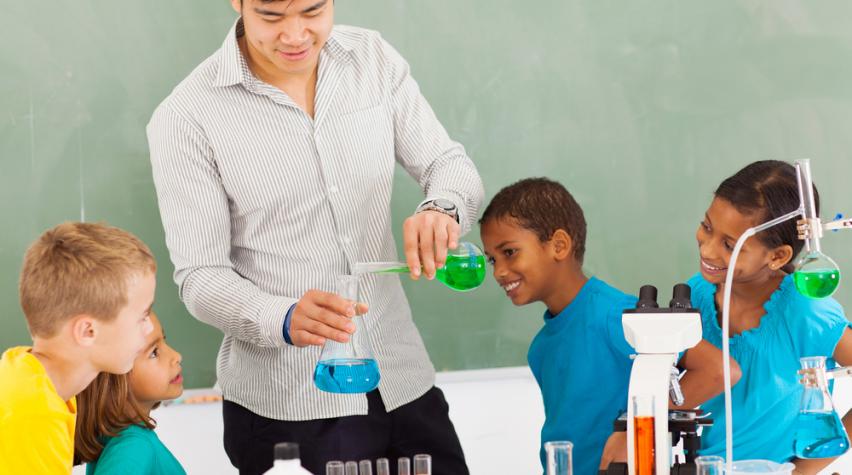
By Colin Young, Univ. of Utah

I have been involved in K-12 outreach for the past five years and have worked with students of all ages — from first graders to high school seniors. For me, outreach has been both personally and professionally rewarding. Through outreach, I have gained some valuable skills, which I think every engineer, especially young engineers, can benefit from.
Refresh your perspective
Most students ask me why I became a chemical engineer and what I like about my job. When was the last time you thought about this? It is easy to get caught up in work and the seemingly never-ending list of things to be done, and to lose focus on what you really enjoy about your career. Being in a classroom and answering these kinds of questions for young students can help you better understand where you want to be and what you want to accomplish in your career.
Have some fun
It is important, every once in a while, to revisit the truly wondrous things that sparked your interest in science. What chemical engineer doesn’t love lighting something on fire or creating a chemical reaction? Demonstrations and experiments that wowed you as a child are part of the reason you fell in love with science in the first place, and sharing this experience with students can be incredibly rewarding. Sometimes, it can be refreshing to be reminded that science and engineering are fun, not just work.
Hone your teaching skills
By performing outreach, my mentoring skills have greatly improved. At some point in almost any career, we are required to guide a younger, newer employee through a project. Are you able to give clear instruction? Do you get frustrated easily when someone is confused? This is your chance to put some of those skills to the test with a tough, but enthusiastic, audience. Guiding students through a project and assessing what they learned at the end of your lesson is an excellent way to gauge and improve your mentoring abilities.
Learn to present
Giving presentations is a large aspect of many careers, and presenting to students in a classroom is an excellent place to refine your skills. Chemical engineers are required to give presentations to any number of different audiences, technical and nontechnical. Learning to tailor a presentation to a variety of audiences is an important skill of successful speakers. Are you able to keep a room intent on following your message, or are listeners getting lost in the jargon and technical details? Everything from the pictures on your slides to the specific words you say needs to be precisely throughtout to provide clarity to your message. A classroom of students will quickly let you know if you are engaging and interesting, or have completely lost them.
Improve society
Finally, outreach has a significant societal benefit. Many students are never given an opportunity to meet an engineer. At the end of high school, I had no idea what chemical engineers do for a living. I struggled to see the importance of learning science or math until I got to college, as I found my classes in high school to be uninspiring. While experiences vary depending on teachers and schools, my experience, sadly, is not uncommon.
The scientists and engineers in my life now are some of the most driven and passionate people I have ever met. That passion is what students need to see, earlier and more often, to change the cultural stigmas and perceptions about science and math. We need to emphasize the rewarding career paths in these fields, and show students that by studying math and science, they can create a better world. And we need to instill these messages in our kids before it is too late.
I encourage you to seek out opportunities to participate in outreach. Over the past two years, I have been involved in outreach at the AIChE Annual Meeting — performing demonstrations and being on a careers panel for local high-school students. These kinds of activities are an excellent place for you to start working with students, as well as other experienced professionals and seasoned outreach mentors. If you are interested in being a part of the outreach program for this year’s AIChE Annual Meeting in Atlanta, GA, contact Giselle Schlegel (gkschleg@syr.edu). You’ll be surprised to find that it can be fun, exciting, and refreshing, and you will be amazed at how eager students are to learn. Take it on. You won’t regret it.
This piece originally was published in the Novebmer 2014 issue of CEP magazine.



